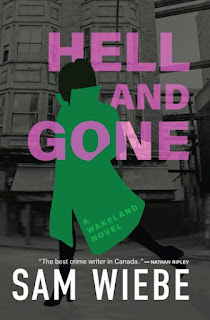 (“the definitive Vancouver crime novel”), Cut You Down (“successfully brings Raymond Chandler into the 21st century”), and Hell and Gone ("the best crime writer in Canada").
(“the definitive Vancouver crime novel”), Cut You Down (“successfully brings Raymond Chandler into the 21st century”), and Hell and Gone ("the best crime writer in Canada").
Wiebe’s other books include Never Going Back, Last of the Independents, and the Vancouver Noir anthology, which he edited.
Wiebe’s work has won the Crime Writers of Canada award and the Kobo Emerging Writers prize, and been shortlisted for the Edgar, Hammett, Shamus, and City of Vancouver book prizes.
Recently I asked the author about what he was reading. Wiebe's reply:
Naben Ruthnum’s A Hero of our Time is both brutally, achingly funny, and precision-tuned to nuances of identity and commerce. Authors, academics—Visit Sam Wiebe's website.all of us—perform a fair amount of self-mythologizing. In some ways it’s inevitable. What Hero does so well is express the cost of these narratives, question their inevitability, and challenge the hypocrisy of cloaking your ambition in an “origin story” designed to get what you want. What happens when someone challenges your well-crafted story—or in the case of the main character, hoovers it up into their own? The highest praise I can pay A Hero of Our Time is that if it were written worse, the ideas simplified, the edges rounded off—if it were more dishonest but just as well-written—it would win every literary award in the country.
Any praise I can heap on Hilary Mantel’s Cromwell trilogy has been matched by much sharper reviewers. What makes Wolf Hall, Bring Up the Bodies,and The Mirror and the Light so great, so much more than an attempt at explaining the Tudor era, is that the characters are drawn with details and dialogue so well chosen, the conflicts so clearly and brilliantly illustrated, the books feel like reading about contemporaries. Thomas Cromwell is impossible not to admire, pity, and root for over a couple of thousand pages. Wolf Hall was recommended to me a decade ago by my Shakespeare professor and grad supervisor. I’m just finishing the third book now. Well worth the wait.
My Book, The Movie: Invisible Dead.
The Page 69 Test: Invisible Dead.
The Page 69 Test: Cut You Down.
Q&A with Sam Wiebe.
The Page 69 Test: Hell and Gone.
--Marshal Zeringue




